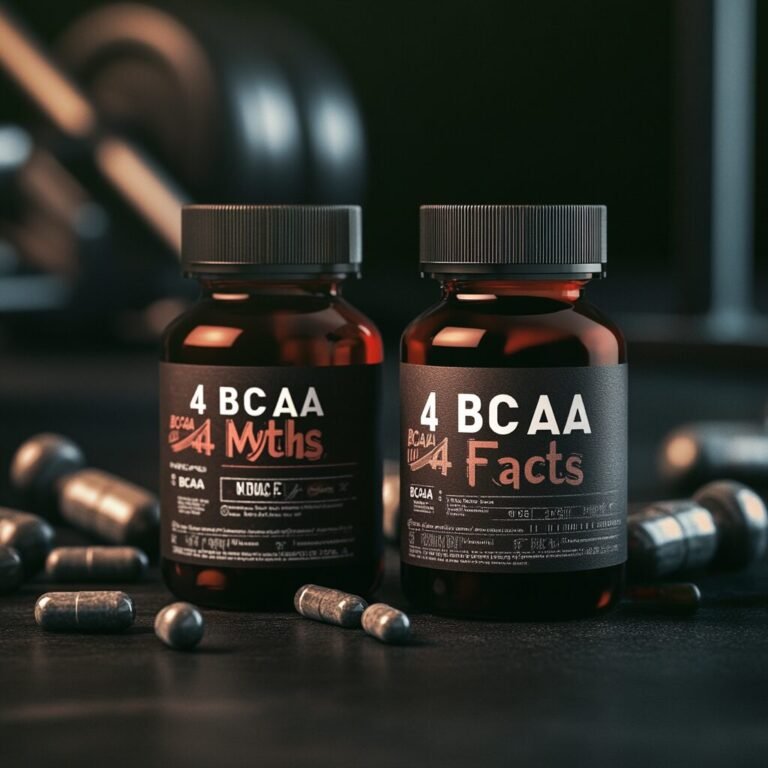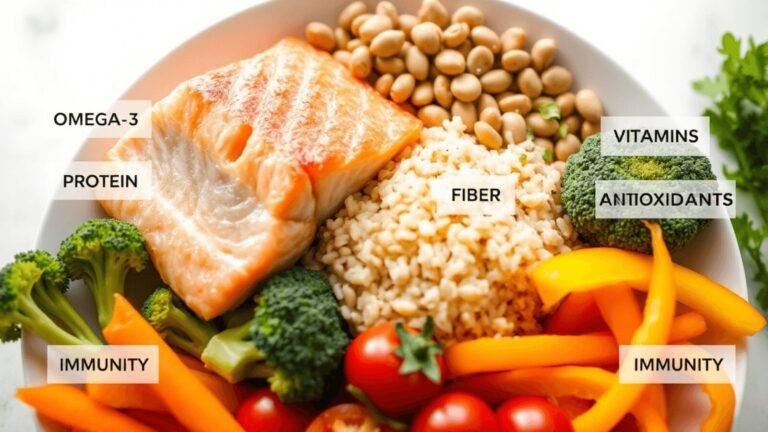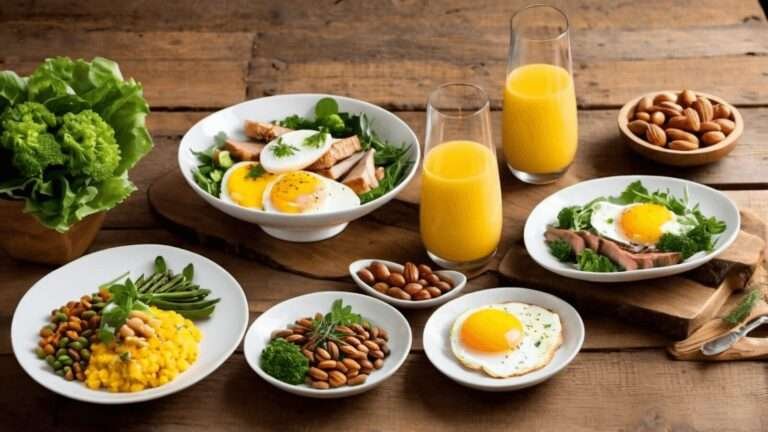4 Myths & 4 Facts About BCAA: What Every Bodybuilder Should Know

Many think supplements like BCAAs can help you build muscles faster during bodybuilding. BCAAs are made of three amino acids—leucine, isoleucine, and valine—and are known for helping with performance and recovery. But while they can be helpful, their effects are sometimes exaggerated and unclear, leading to several BCAA myths and facts about bodybuilding.
In this blog, we’ll give you a comprehensive idea about BCAA by breaking some of the common myths. We will explain, using science in simple terms, the real benefits and limitations of these supplements. This, in turn, will help make apt decisions regarding your diet and regular workout-be it a fresher or an experienced one.
Myth 1: BCAAs are Essential for Muscle Growth

Fitness people believe that taking BCAAs is vital for the creation of huge muscles, the amino acids being leucine, isoleucine, and valine. They use to say that huge muscles cannot be achieved without it. Belief in BCAA normally refers to a special powder taken either before or after training for the ultimate performance results.
While BCAAs can build muscle, it’s important to remember that they aren’t everything: foods like eggs, chicken, and beans have all the building blocks your muscles need in order to grow and repair, plus all sorts of other bonus nutrients that BCAA supplements don’t.
Though BCAA supplements have their role in building up muscles, dependency on them solely must be avoided. The best approach therefore would be incorporating them into a well-balanced diet that also comprises healthy nutrient-rich foods. In this way, bodybuilders will achieve maximum benefit from their diet and will not rely on supplements only to develop their muscles.
Fact 1: Balanced Diets Provide Necessary Amino Acids

Whole foods are great for health because they provide the nutrients your body needs. For example, salmon is rich in proteins, healthy fats, and vitamins conducive to muscle growth and repair, as detailed in BCAA Myths and Facts for Bodybuilding, unlike some protein powders.
Naturally occurring foods such as eggs, chicken, Greek yogurt, and beans have high contents of proteins and nutrients. A meal of spinach chicken stir-fry will provide iron, zinc, vitamin B12, and protein that supplements cannot replace fully. Better muscle growth will be achieved through a diet made up of whole foods rather than supplements.
Eating a variety of natural proteins is healthier than relying on supplements alone. Athletes with diverse diets often have better blood sugar control and heart health. What is more, plant base proteins like quinoa and lentils have special elements that enhance other recovery processes than what discussion has unveiled into supplementations.
Muscle building does not have much to do with health maintenance and everybody can choose which one he wants. By choosing whole foods over BCAA supplements, there is more benefit than looking great or getting your special nutrients from nature: Vehicles and electronics are also on the list, with fresh produce like avocados and almonds being on the list as well.
Myth 2: Timing of BCAA Intake is Crucial

While some would believe the true magic is in timing their BCAA supplements around the times of workouts, many in bodybuilding circles seem to consider this gospel truth. Indeed, enthusiasts who feel that this method allows for better assimilation of nutrition by the muscles than usual take BCAAs before and after workouts.
Recent research suggests that BCAAs taken at the time of exercise may have some minor benefits for recovery, but overall, effects on muscle growth and performance from BCAAs are minor, as long as you are getting enough protein throughout the day.
Rather than worry about the timing of supplements down to the last second, what’s most important is the food in. Your body is constantly burning, like a fire, day in and day out, requiring constant fuel to replenish itself. Whole foods can give your muscles what they need for repair and building, ultimately providing long-term energy and satiety for much longer compared to that from just supplements.
Thus, timing of BCAA supplements to workout session is not detrimental, and they may indeed prove useful in certain circumstances such as during high intensity training or during periods of prolonged fasting but really the golden rule should be simply; ensure you’re taking enough protein each and every day. By choosing a healthy diet, you will contribute to body’s needs without focusing on the specific supplements.
Fact 2: Overall Protein Intake Matters More Than Timing

The emphasis should be placed on consuming protein at different intervals in a day so as to build muscles rather than when to take BCAAs, whether before or after a workout. It doesn’t matter quite as much when you take in your protein as long as you’re getting enough more often than not.
Recent studies suggest that the timing of protein intake after a workout may not be as crucial as previously believed. One study found little difference in muscle building between spreading protein intake throughout the day and consuming it right after exercising. That means our body can use protein at any time, not just after training.
Feeding the muscles is like watering the plant. They grow with nutrition. Aim to consume 1.6 to 2.2 grams of protein per kilogram of body weight daily. While timing of your protein is important, take more notice of frequent consumption to repair and build up the muscles, much as one water’s plants regularly.
What makes it crucial for a bodybuilder to incorporate high quality protein foods including lean meats, dairy products, legumes and quinoa into his/her diet. This makes sure that you get all your requirements for the nutrients without necessarily considering time especially if you have special occasions that dictate, you’re eating times. To get the best out of one, it is recommended that one’s attention be paid on good nutrition than worrying about diet fads.
Myth 3: Higher Doses Lead to Better Results

As we step into the bodybuilding industry some individuals have the notion that the more, they consume BCAA they are able to develop muscles and perform better. There are not enough scientific data about this concept, which may be adverse, however, there isn’t enough scientific evidence supporting it. It is very similar to a painter putting too much color on a picture and thus destroying a picture instead of enhancing it.
New research contradicts the prospect of piling on the BCAAs. It turned out that the idea of doing more and taking more doesn’t give additional results in muscle building and endurance. It has its advantages, but going overboard with it as the supplement suggested, it’s excreted from the body but won’t bring any extra benefit.
Anything in excess is poison. Excessive consumption of BCAA results in stomach problems and puts one’s body out of balance, hence pressuring the liver and kidneys. Just as a pinch of salt in a dish adds to it and an excess of it renders it worthlessly consumed, so also an excess of BCAA puts a dent in health. It is to be taken in recommended quantities to maintain good health.
It is important to not harm the body and, at the same time, achieve the best outcome. They suggest that intake should be according to weight and activity level like an architect who guarantees the construction will be stable by measuring it appropriately. Making sure you get the right dosage enables you to accomplish your goals in a healthy and safe manner.
Fact 3: Optimal Dosages Based on Current Research

Easy ways to work with BCAAs and avoid overload following science-based rules. According to the current research findings, the normal bodybuilder should consume between 5-10 grams of BCAAs every day depending on the sweating rates and the consumed nutritional calories. Maintaining within this range is beneficial to muscle rehabilitation and development with virtually no side effects and is somewhat like keeping the car’s wheels on the perfect line.
This approach to eating involves the habit of getting ‘attuned to the needs of the body’, as with tuning a machine. Just like a superior-performing car engine, which requires the right mix of fuel and air, so would the body need the meat protein derived from diet and supplement intake in the right proportion. Too little or too much creates all kinds of problems; hence, the derivation of this in the right proportion itself is extremely important.
In terms of diet, you need to pay attention to your nutritional intake. Try to eat several small meals during the day instead of a few large meals because it’ll provide constant energy. Be careful with the kind of supplements that you choose to take and get them from reputable stores. This approach enables you to wake up to the body’s rhythm and thus enables the effectiveness of the plan.
This is the knowledge, which allows avoiding the mistakes and using the principles properly, for example, those, stated in BCAA Myths and Facts for Bodybuilding. That said, you can see that decisions made regarding portions and portion control and figuring out differences in portion control can skyrocket muscle gain if applied to nutrition.
Myth 4: BCAAs Can Replace Whole Protein Meals

Most bodybuilders are of the opinion that BCAAs can actually substitute protein food; people think that supplements can solve the issue in the same way as grilled chicken, quinoa, and beans can. However, this disregards the need to get nutrients contained in whole foods, which are important for muscle construction and health.
Many whole protein foods such as salmon contain vitamins and antioxidants, and just like how a cake recipe requires all the ingredients to be great, so does the human body need all the nutrients present in the food in the right portions. Only taking supplements can never help one get all the improvements that come with taking the whole food.
Relying solely on BCAA supplements and not whole meals is like running a competition with one shoe on. It is doable but far from ideal. BCAA does help muscle growth during your workout, but it doesn’t provide other necessary nutrients your body wants for full recovery and performance. A varied diet is necessary, and no supplement can completely eliminate all nutritional needs.
Therefore, the best will be a combination of healthy meals and one supplement BCAA for good results in muscle building as well as health. Most of the nutrients in your body come from lean meats, fish, dairy or nondairy substitutes for items like calcium), beans, nuts, and seeds. Supplements help you to better your results, but you must have good feeding.
BCAA Supplements Ultimate Guide
BCAA Supplements
Fact 4: Integrative Approach to Nutrition Yields Best Results

Just imagine a bodybuilder getting ready for a competition. BCAAs can help with muscle recovery and provide an energy boost, but studies suggest that athletes who take BCAAs along with a high-protein diet might actually lose muscle and perform worse compared to those who take different supplements.
Meals which include each protein, a serving of (good) fats, and complicated carbs are fine. Imagine a dishful of rainbow: grilled chicken, quinoa, spinach & avocado. Taking this meal with BCAA in the proper dosage makes it even more awesome.
Eating a variety of foods daily supports muscle building and overall health. Post-workout options like protein shakes, Greek yogurt, or cottage cheese aid muscle recovery. Keeping your diet diverse and balanced helps you stay on track with your fitness goals.
A balanced eating plan combined with the intake of healthy food supplemented with necessary supplements, such as BCAA Myths and Facts for Bodybuilding, will bring long-lasting good health. Patience is required to remember that getting in shape can take time.
Conclusion: Clarity Through Concreteness: Embracing Informed BCAA Use

BCAA Myths and Facts for Bodybuilding clarify that while BCAA can help, it won’t magically make your muscles bigger. To build muscles, you must eat enough protein throughout the day. Supplements containing BCAA can provide extra support but are no substitute for proper meals. Understanding how BCAA really works with food and supplements helps individuals make healthier choices and focus more on eating well for long-term health.
Also, it gives you a deeper understanding of what BCAAs are and how they can be beneficial if used properly. It can increase your workout performance but does not guarantee it will make you grow muscles overnight. Just remember, BCAAs, when taken with the proper diet and exercise, will yield the results that its users want to see. It would help if you concentrated on the foods you consume and the exercises you take to achieve the dream body you desire.
BCAA Myths and Facts for Bodybuilding FAQs
Q: What is BCAA, and for what reasons do bodybuilders like them?
A: BCAAs are amino acids-essential ones (leucine, isoleucine, and valine)-which help in muscle repair. They are famous for reducing muscle soreness and helping recover from the gym.
Q: Do I need to take BCAA supplements to build muscle?
A: No, a balanced diet supplies all the amino acids your body needs through whole foods like chicken, eggs, and beans.
Q: How does timing of BCAA intake play a role?
A: Timing is very minor. What’s most important is getting your total daily protein needs, not necessarily around the time of your workout.
Q: Is it possible to take too many BCAAs?
A: Yes, it is, and if taken in too large a dose, can lead to stomach issues and imbalances. Stick to 5-10 grams per day based on your activity level.
Q: Can BCAA supplements replace whole meals?
A: No, whole foods offer more complete nutrition. BCAAs can’t replace the variety of nutrients found in meals like lean meats or legumes.
Q: What are the main myths about BCAA supplements for bodybuilding?
A: BCAA Myths and Facts for Bodybuilding include that BCAAs are required for muscle build-up, the timing of uptake is very important, the use of higher doses is helpful in the bodybuilding process, and lastly, BCAAs can be used to replace whole meals. Here, these myths are explained scientifically.
